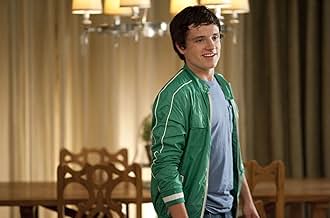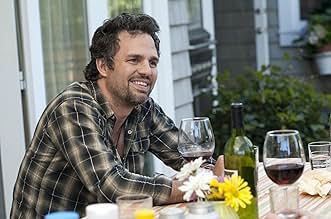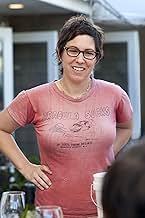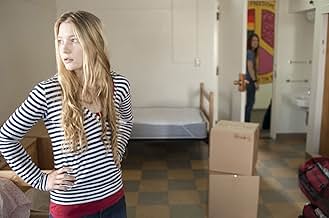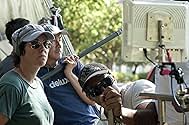NOTE IMDb
7,0/10
136 k
MA NOTE
Deux enfants conçus par insémination artificielle font entrer leur père biologique dans leur vie familiale peu conventionnelle.Deux enfants conçus par insémination artificielle font entrer leur père biologique dans leur vie familiale peu conventionnelle.Deux enfants conçus par insémination artificielle font entrer leur père biologique dans leur vie familiale peu conventionnelle.
- Réalisation
- Scénario
- Casting principal
- Nommé pour 4 Oscars
- 29 victoires et 133 nominations au total
Yaya DaCosta
- Tanya
- (as Yaya Dacosta)
Rebecca Lawrence Levy
- Brooke
- (as Rebecca Lawrence)
James MacDonald
- Clay's Dad
- (as James Macdonald)
Stuart Blumberg
- Sous-chef
- (non crédité)
Diego Calderón
- Waiter
- (non crédité)
Avis à la une
The kids are better than all right, they're terrific. So are their lesbian moms, played with insight and skill by Annette Bening and Julianne Moore. Trouble is, the film that surrounds them turns out to be less than compelling stuff despite its topicality. The sperm donor responsible for the family at hand is played by Mark Ruffalo, and although a talented fellow, his character has enough foibles to keep him emotionally distant from the viewer. The story of his introduction to this modern family goes in a couple of directions, but all feel familiar and none satisfactory. Terrific premise, but unfulfilled promise.
The movie follows a Nic and Jules, a middle-aged couple raising their two teenage children, Joni and Laser in suburban L.A. And everything seems to be going just fine until the moment Joni turns 18 and is convinced by her brother to reach out to their biological father. Hesitating at first, Joni eventually puts in a call to the sperm bank, who puts her in touch with Paul, a restaurant owner and all around "cool dude" who seems willing to meet the kids he never knew he had. As Paul arrives in their lives the family is thrown into disarray and sticky situations that threatens the stability of this already unusual family.
The Good: The acting is great with good chemistry between Nic and Jules. Well what else would you expect of Annette Benning and Julianne Moore and not to forget, Mark Ruffalo. And the younger actors (Mia Wasikowska and Josh Hutcherson) give believable and very good performances.
Also the films is very energetic and never really looses your attention.
The Bad: The Films stumbles around a bit not really knowing if it's a romantic comedy or a a family drama specially at the end but fortunately stays true to its core.
The Good: The acting is great with good chemistry between Nic and Jules. Well what else would you expect of Annette Benning and Julianne Moore and not to forget, Mark Ruffalo. And the younger actors (Mia Wasikowska and Josh Hutcherson) give believable and very good performances.
Also the films is very energetic and never really looses your attention.
The Bad: The Films stumbles around a bit not really knowing if it's a romantic comedy or a a family drama specially at the end but fortunately stays true to its core.
The nuclear family takes on a different spin when both parents are same sex and the kids are the product of a male sperm donor in The Kids Are All Right. When traumatic upheaval and revelations strike such a family, the results can be amusing and also tragic. Annette Bening and Julianne Moore highlight an insightful script about domesticity turned on its head.
Nic (Bening) and Jules (Moore) are lesbian parents of two teens, Joni and Laser. One day the children research and contact their biological father, Paul (Mark Ruffalo), who agrees to meet his progeny. After an awkward first meeting, things actually go well as the new family connections are explored by the kids and their newly found father. The couple of Nic and Jules are a contrast; Nic is the physician who is totally controlling while Jules is still trying to find herself with a new business of landscaping. Laser hangs with the wrong crowd and begins to realize that he deserves better through his bond with Paul. Joni is trying to assert herself as an adult and prepares to go to college. The moms show a parental responsibility to watch over their children and want to meet the dad. When Paul hires Jules to do work on his restaurant landscape, the two connect. As Paul's influence begins to overcome the family, Nic feels left out. But there is an attraction between Jules and Paul that leads to a torrid affair, and when Nic discovers the truth, the family is torn apart. Into this mix are two maturing children whose emotions will be tested throughout.
The roles are well acted especially by Benning as a betrayed spouse, and in particular, her scene of revelation about Jules is a marvel of expressiveness and devastating heartbreak. This culminates in a powerful moment with all the principals present at Paul's dinner table. Moore gives solid support and shines in her heartfelt plea to her family near the end. The ensemble is well cast particularly Ruffalo whose almost bystander role is suddenly elevated to catalyst and disruptor of the family's dynamic.
The story has a nice balance of serious tones and comedic elements born out of the situations. The themes work on several levels like ingredients of a zesty recipe: the family chemistry, the couple of Nic and Jules, the kids' developing bond with Paul, Paul and Jules, and shake and mix well. Everyone has needs and wants, and the strongest is a need to belong to a family and the need to connect with another human being whether it be Laser and his friends, Paul and Jules, Paul and his children, and Nic and Jules. Amid the conflicts, no one escapes unscathed. There are no real heroes or villains here, only hard truths about life and relationships.
The fact that two lesbians are having the conflict over infidelity may seem novel on the surface, but it could easily have been a heterosexual couple. In fact the notion of two lesbians virtually disappears as we witness and understand this family unit with its warts and all. It could be any family when you think about it. The fact that both Benning and Moore play their respective spousal roles so convincingly is a testament to their acting skills playing off an excellent script by Stuart Blumberg and Lisa Cholodenko, who also directs. The ending rings true and shows not only how far the relationships have come, but how that foundation, despite some serious challenges, is strong enough to survive. Life moves on, and there is hope for the future.
There are not a lot of loose ends in this story although, toward the end, it would be nice to get a bit more resolution to Ruffalo's character. The film does contains a couple of brief explicit sex scenes without which this would essentially be a PG rated film. There is little to quibble about, and the viewer gets to experience one of the more insightful domestic dramas in recent years.
Nic (Bening) and Jules (Moore) are lesbian parents of two teens, Joni and Laser. One day the children research and contact their biological father, Paul (Mark Ruffalo), who agrees to meet his progeny. After an awkward first meeting, things actually go well as the new family connections are explored by the kids and their newly found father. The couple of Nic and Jules are a contrast; Nic is the physician who is totally controlling while Jules is still trying to find herself with a new business of landscaping. Laser hangs with the wrong crowd and begins to realize that he deserves better through his bond with Paul. Joni is trying to assert herself as an adult and prepares to go to college. The moms show a parental responsibility to watch over their children and want to meet the dad. When Paul hires Jules to do work on his restaurant landscape, the two connect. As Paul's influence begins to overcome the family, Nic feels left out. But there is an attraction between Jules and Paul that leads to a torrid affair, and when Nic discovers the truth, the family is torn apart. Into this mix are two maturing children whose emotions will be tested throughout.
The roles are well acted especially by Benning as a betrayed spouse, and in particular, her scene of revelation about Jules is a marvel of expressiveness and devastating heartbreak. This culminates in a powerful moment with all the principals present at Paul's dinner table. Moore gives solid support and shines in her heartfelt plea to her family near the end. The ensemble is well cast particularly Ruffalo whose almost bystander role is suddenly elevated to catalyst and disruptor of the family's dynamic.
The story has a nice balance of serious tones and comedic elements born out of the situations. The themes work on several levels like ingredients of a zesty recipe: the family chemistry, the couple of Nic and Jules, the kids' developing bond with Paul, Paul and Jules, and shake and mix well. Everyone has needs and wants, and the strongest is a need to belong to a family and the need to connect with another human being whether it be Laser and his friends, Paul and Jules, Paul and his children, and Nic and Jules. Amid the conflicts, no one escapes unscathed. There are no real heroes or villains here, only hard truths about life and relationships.
The fact that two lesbians are having the conflict over infidelity may seem novel on the surface, but it could easily have been a heterosexual couple. In fact the notion of two lesbians virtually disappears as we witness and understand this family unit with its warts and all. It could be any family when you think about it. The fact that both Benning and Moore play their respective spousal roles so convincingly is a testament to their acting skills playing off an excellent script by Stuart Blumberg and Lisa Cholodenko, who also directs. The ending rings true and shows not only how far the relationships have come, but how that foundation, despite some serious challenges, is strong enough to survive. Life moves on, and there is hope for the future.
There are not a lot of loose ends in this story although, toward the end, it would be nice to get a bit more resolution to Ruffalo's character. The film does contains a couple of brief explicit sex scenes without which this would essentially be a PG rated film. There is little to quibble about, and the viewer gets to experience one of the more insightful domestic dramas in recent years.
It's unavoidable to compare. We're at the beginning of the world our grandchildren are going to take for granted. But now, we compare and realize that family is by choice or design a place, a state of mind, in which love does or must flourish. Beautifully told with a sensational performance by Annette Bening. Without preaching or candy coating the story we realize that the future has a chance. Two women, one sperm donor and two children. Why not? We see the results on the children's faces. Mia Wasikowska is the daughter. Smart, compassionate, mature beyond her years. Josh Hutcherson is the son and, although he is the least developed character, I loved him, with his lopsided smile and his healthy curiosity. Mark Ruffalo, wonderful, showing us, as the sperm donor, another face of a character he has a monopoly in, the lovable loser. He is terrific! Julianne Moore is still an actress I find very hard to surrender to. Her acting is so much upfront that it takes you out of the truth she's trying to convey. However I loved the film and I only hope Hillary Swank is not nominated next year so Annette Bening finally gets what she so richly deserves.
OK, so here is what is going on with The Kids Are All Right. When I think of Lesbian couples the image of the family portrayed by the stars of this movie comes to mind. I live in Kentucky so I don't ever really come into contact with any established lesbian couples, but I remember watching this video in a Sociology class about proposition 8 that featured all of these Kentucky based gay couples whose wholesomeness and nuclear family awesomeness were supposed to convince me that gay people should be allowed to adopt kids. For the record it didn't need to because I'm completely for gay people doing anything they want, but if I was ignorant then I might have been convinced. I mean, the couples were perfect, upstanding members of the community, their kids were involved in sports and clubs and they all just screamed 'It's Okay to be Gay and Have Kids!'.
What I most remember is that the families kind of all had this lingering desperation in their smiles, like were trying harder to be happy than most people because they were aware that other people would be judging them based on their ability to be happy under the scrutiny of social judgment. The family in the movie, Nic (Annette Benning), Jules (Julianne Moore), Lazer(Josh Hutcherson), and Joni (Mia Wasilowska), kind of all have that same desperation lingering around them. The film basically centers around what happens when the tension brought on by that added responsibility is broken by the intrusion of an outsider.
That intruder is Mark Ruffalo. I think the evolution of his character is one of the most interesting parts of the film. When we first meet Mark, he's just so cool. Everybody wants to be like him. Relaxed, carefree, seemingly very open and with an uncanny ability to understand and relate to people. He grows vegetables, doesn't hurt the environment and has sex with YaYa from America's Next Top Model. He seems like the opposite of Nic, the uptight, control freak, who's very traditional and leads a very traditional life despite or in spite of her gay lifestyle. So you think, 'oh, this movie is going to be about an outsider coming into a family and repairing the relationships within it'. Nic will loosen up and the kids will be able to open up to people because someone finally understands them. But unfortunately film hasn't been that neat and tidy since the 1930s. In this film, certain things come into play that switches our perspective and we come to identify more with Nic's character than we really expected. But we share sympathy with every character. At the end, we actually have the most sympathy for Mark, I would say.
This switch was unexpected and I think it makes the film special and more worthy than just a farce about a Lesbian couple and a straight guy. The best films are ones in which our expectations are inverted, I think. A film should be like a beautiful unopened flower. The bud is beautiful and then it opens, changes and becomes even more beautiful because of those changes. I know that sounds all preachy and lame but if you can't be preachy and lame on the internet than where can you?
My favorite parts of the film were where I saw flashes of my own relationships portrayed in situations presented by the characters. The conflict between Nic and Jules, where they love each other, accept each other, but clearly don't always like each other, injects the film with humor while at the same time serving as a painful reminder of how hard it is to settle down. That struggle to just continue to like the people you love is portrayed so poignantly in the little digs Nic pokes at Jules every now and again. The frustration they both feel is palpable. And If you have an overbearing mother like I do, than you know how it looks and feels to be shut down by your mom like Laser and Joni are by theirs. After every unintentionally overbearing comment, I was like 'wow, that was a real moment.' I have to say that I was a little disappointed with Laser's character. I feel like his character was so rich in the beginning, but really died away to almost nothing by the end. Just a few archetypal little brother comments thrown in to remind us that he's still there. I feel this way because we spent a lot of time with his character in the beginning, understanding that he's a fifteen year old boy. He's moody. And he's searching for something to define him outside of his mothers. That's undoubtedly why he is initially so passionate about finding his biological father. But though his relationship with Mark is pivotal, it is not really explored as deeply as is Mark's relationship with Joni. Basically his character was traveling to a destination that it just didn't reach. But this could be intentional. Teenagers are supposed to be mysterious and confusing so maybe it's true to his character to leave him unexplored. However, it did disappoint me. I don't know how this movie is going to do during awards season. I assume it will do well, but more because of the trendy subject manner than due to it's merit as a film. I don't know, the film society just votes that way sometimes. But it moved me and that's worth an award to me.
What I most remember is that the families kind of all had this lingering desperation in their smiles, like were trying harder to be happy than most people because they were aware that other people would be judging them based on their ability to be happy under the scrutiny of social judgment. The family in the movie, Nic (Annette Benning), Jules (Julianne Moore), Lazer(Josh Hutcherson), and Joni (Mia Wasilowska), kind of all have that same desperation lingering around them. The film basically centers around what happens when the tension brought on by that added responsibility is broken by the intrusion of an outsider.
That intruder is Mark Ruffalo. I think the evolution of his character is one of the most interesting parts of the film. When we first meet Mark, he's just so cool. Everybody wants to be like him. Relaxed, carefree, seemingly very open and with an uncanny ability to understand and relate to people. He grows vegetables, doesn't hurt the environment and has sex with YaYa from America's Next Top Model. He seems like the opposite of Nic, the uptight, control freak, who's very traditional and leads a very traditional life despite or in spite of her gay lifestyle. So you think, 'oh, this movie is going to be about an outsider coming into a family and repairing the relationships within it'. Nic will loosen up and the kids will be able to open up to people because someone finally understands them. But unfortunately film hasn't been that neat and tidy since the 1930s. In this film, certain things come into play that switches our perspective and we come to identify more with Nic's character than we really expected. But we share sympathy with every character. At the end, we actually have the most sympathy for Mark, I would say.
This switch was unexpected and I think it makes the film special and more worthy than just a farce about a Lesbian couple and a straight guy. The best films are ones in which our expectations are inverted, I think. A film should be like a beautiful unopened flower. The bud is beautiful and then it opens, changes and becomes even more beautiful because of those changes. I know that sounds all preachy and lame but if you can't be preachy and lame on the internet than where can you?
My favorite parts of the film were where I saw flashes of my own relationships portrayed in situations presented by the characters. The conflict between Nic and Jules, where they love each other, accept each other, but clearly don't always like each other, injects the film with humor while at the same time serving as a painful reminder of how hard it is to settle down. That struggle to just continue to like the people you love is portrayed so poignantly in the little digs Nic pokes at Jules every now and again. The frustration they both feel is palpable. And If you have an overbearing mother like I do, than you know how it looks and feels to be shut down by your mom like Laser and Joni are by theirs. After every unintentionally overbearing comment, I was like 'wow, that was a real moment.' I have to say that I was a little disappointed with Laser's character. I feel like his character was so rich in the beginning, but really died away to almost nothing by the end. Just a few archetypal little brother comments thrown in to remind us that he's still there. I feel this way because we spent a lot of time with his character in the beginning, understanding that he's a fifteen year old boy. He's moody. And he's searching for something to define him outside of his mothers. That's undoubtedly why he is initially so passionate about finding his biological father. But though his relationship with Mark is pivotal, it is not really explored as deeply as is Mark's relationship with Joni. Basically his character was traveling to a destination that it just didn't reach. But this could be intentional. Teenagers are supposed to be mysterious and confusing so maybe it's true to his character to leave him unexplored. However, it did disappoint me. I don't know how this movie is going to do during awards season. I assume it will do well, but more because of the trendy subject manner than due to it's merit as a film. I don't know, the film society just votes that way sometimes. But it moved me and that's worth an award to me.
Le saviez-vous
- AnecdotesMark Ruffalo filmed his role in only six days.
- GaffesLaser tells Paul that Joni got the National Merit Scholarship for science; however, National Merit Scholarships are not awarded in any specific categories. Candidates are chosen because of high scores on the PSAT, which does not include a science section.
- Bandes originalesCousins
Written by Ezra Koenig, Rostam Batmanglij, Chris Baio, and Chris Tomson
Performed by Vampire Weekend
Courtesy of XL Recordings Ltd
By arrangement with The Beggars Group
Meilleurs choix
Connectez-vous pour évaluer et suivre la liste de favoris afin de recevoir des recommandations personnalisées
- How long is The Kids Are All Right?Alimenté par Alexa
Détails
- Date de sortie
- Pays d’origine
- Site officiel
- Langue
- Aussi connu sous le nom de
- Los niños están bien
- Lieux de tournage
- Sociétés de production
- Voir plus de crédits d'entreprise sur IMDbPro
Box-office
- Budget
- 4 000 000 $US (estimé)
- Montant brut aux États-Unis et au Canada
- 20 811 365 $US
- Week-end de sortie aux États-Unis et au Canada
- 491 971 $US
- 11 juil. 2010
- Montant brut mondial
- 34 758 951 $US
- Durée1 heure 46 minutes
- Couleur
- Mixage
- Rapport de forme
- 1.85 : 1
Contribuer à cette page
Suggérer une modification ou ajouter du contenu manquant

Lacune principale
By what name was Tout va bien! The Kids Are All Right (2010) officially released in India in Hindi?
Répondre







